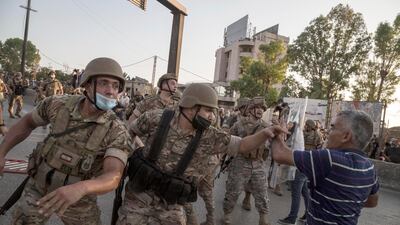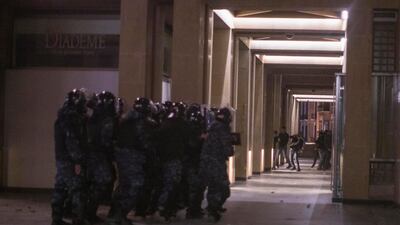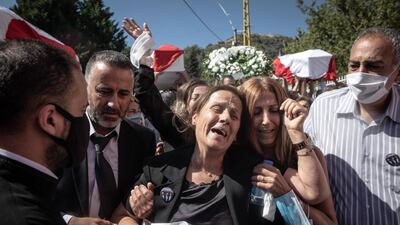Parliament passed a new law on Monday criminalising sexual harassment and amended existing family violence legislation, a double victory for women in Lebanon despite resistance from militant group Hezbollah.
It is the first time that sexual harassment is defined and criminalised in Lebanon, where cases of violence against women have multiplied during the Covid-19 outbreak. The Internal Security Forces noted a 51 per cent increase in calls to the national domestic violence hotline from February to October as cases surged under lockdown amid financial pressures and restrictions on movement.
The new legislation is a major shift in attitudes but is just one step to tackling a culture of normalised harassment, rights campaigners said.
Member of parliament Inaya Ezzedine, who presented the new law, said this is a first move to protect and empower victims.
“We are telling harassers: you cannot target a woman or a minor or anyone and evade punishment. You will pay for it, whether it is by going to jail or paying a fine,” Ms Ezzedine said.
Sexual harassment has been defined as a "negative behaviour" of a sexual nature that may or may not be repeated, targeting a victim of any gender. It also includes pressuring victims to perform sexual acts against their will.
Harassers face a minimum jail sentence of one month and up to four years in prison, with repeat offenders facing terms double the length of their previous sentence. A new fund will also be created to support and protect victims of sexual harassment.
Women’s rights groups are cautiously optimistic about the new legislation.
Leila Awada of Kafa, an NGO that works to protect women, said some of the new measures may never be implemented.
“In 2014, when the domestic violence law was passed they said they would create a fund for victims, but seven years later, there is still no fund. And now they also created a new fund for sexual harassment victims,” Ms Awada said.
When Lebanon's domestic violence law was first passed, it had many flaws and needed to be amended, said Claudine Aoun Roukoz, who heads the National Commission for Lebanese Women, a state organisation with a consultative role.
"Although I would have preferred for parliament to accept all the recommendations, I am optimistic because the changes made to the law can be applied easily," she said.
Among the most notable changes is the decision to include abuse occurring “because of marriage” in the definition of domestic violence, broadening the scope to violence resulting from a divorce.
The biggest victory, however, was that the law extended protection orders granted to battered women to include their children who are 13 years old or younger.
“We asked for the protection orders to include children under the age of 18, but it was a tough battle and only children under the age of 13 were included,” Ms Ezzedine said.
Marriage, divorce and child custody are ruled on by religious courts in Lebanon, which recognises 18 religious sects. Matters of custody are adjudicated by courts specific to each religious group.
In the past, protection orders included only children under the victim’s custody, but the age limit varies according to sect. For Shiites, for instance, custody goes to the mother until a boy reaches two years of age and a girl turns seven, leaving older children potentially at the mercy of an abusive father.
This also meant that women who faced abuse were granted custody of their child depending on their religion, not on the gravity of the situation.
Hezbollah MP Ibrahim Moussawi, representing the conservative militant group, refused to back the amendments as he said they interfere with the personal status laws, governed by religious courts.
“Legislation must be freed from the opinion of sect leaders,” Ms Awada said. “Even for a law on domestic violence, religious figures were being consulted although it is the state’s job to protect individuals, it’s not up to the sects.”
Ms Awada criticised what she described as a piecemeal approach to legislation, which undermines efforts to protect women. Labour laws, she pointed out, have not been amended to reflect the responsibilities of employers in a case of sexual harassment and abuse of power in the workplace.
She also highlighted other inconsistencies, such as the increased penalisation of women who are victims of prostitution in a law meant to protect victims of abuse.
“The mere fact that sexual harassment is now considered a crime is a good step, but unfortunately legislators want only to show the international community they are reforming, without paying attention to the content of these laws,” Ms Awada said.
She is hopeful, however, that most of the amendments will have a positive effect in the long term. The next step now is to push for a comprehensive law that will protect women from all forms of abuse, she said.
Ms Ezzedine, who is from the Hezbollah-allied Amal party, said the fight for equality and better protection is part of a drive to reform the country, a major demand of the Lebanese people since the onset of a mass anti-government protest movement last October.
“Fighting sexual harassment should be part of the reform agenda that we are demanding, because escaping punishment for this crime is a form of corruption in our society,” she said.






















